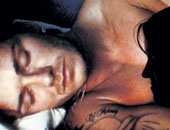 |
| Star attraction: A video installation showing David Beckham sleeping at the National Portrait Gallery in London |
Dark circles, puffy eyes, dry and sallowlooking skin can surely mean only one thing: too many late nights. Time to catch up on your beauty sleep. So accepted is the common wisdom that sleep deprivation affects your looks that results of the first study into the effects of sleeplessness on appearance will come as a wake-up call even to dermatologists and the cosmetics industry.
Experts this week revealed that beauty sleep is not a myth ? but it’s more important for mind than body.
Ronnie Marks, the emeritus professor of dermatology at the University of Wales, Cardiff, conducted the research along with the clinical psychologist Alex Gardner, of the British Psychological Society. Marks says that no previous study had investigated whether lack of sleep did leave you looking worse for wear. “We trawled journals to find anything at all on this area and found nothing,” he says. “It is a first at addressing a subject on the interface of medicine and cosmetics, and the findings were surprising.”
Fifteen subjects, aged 18 to 45, with different skin colour and type were recruited to take part in the study, commissioned by Lanes Kalms Sleep natural sedative, which required them to spend 48 hours living Big Brother-style in one room without any sleep. Using a cutometer device, which measures skin elasticity, hydration levels and redness, assessments were made of the subjects’ skin every 12 hours. Marks and a colleague also checked the development of dark circles, puffiness and wrinkles. Meanwhile, Gardner carried out corresponding psychological tests to discover whether fatigue altered not only self-esteem and self-confidence, but also changed the way subjects thought others perceived them.
Throughout the trial, the use of cosmetics and toiletries was banned; subjects were not allowed to wash or shower and were under constant patrol to ensure that they didn’t nod off. Yet, after two days, although the men generally looked more haggard than the women, there were no convincing dermatological changes other than a drop in the water content of the skin. “Across the board, their appearance was surprisingly good after two days without sleep,” he says. “We expected to find some significant development of dark circles around the eyes and perhaps more redness but, even at the end of the experiment, they didn’t look grossly tired.”
This may come as a bit of a bombshell to a cosmetics industry that sells products on the back of a belief that specific skin-growth factors such as collagen and keratin are produced more rapidly at night, and that fatigue disrupts hormones and can lead to acne flare-ups and excessively dry skin. But, physically at least, it seems that getting the recommended eight hours sleep a night does little to improve the way someone looks.
Even the development of under-eye circles does not seem to be triggered by fatigue. “Some people may think that they get dark circles as a result of being tired but no one really knows what causes them,” Marks says. “So far, the most plausible explanation is that they are the result of increased visibility of venous plexus, or tiny blood vessels, that occurs with changes in the water content of tissues around the eyes.” But it may or may not be linked to fatigue. Bags under the eyes are also not necessarily a result of tiredness. They’re mainly caused by age making the muscles under the eyes sag and the fat beneath bulge out, but fatigue, allergies and some medical problems seem to make the problem worse.
What tiredness did change dramatically, however, was the way people saw themselves. “As the subjects got more fatigued, their self-perceptions changed a lot,” says Gardner. “When their skin felt good at the start of the study, they felt good about themselves and were not worried about how others viewed them. But towards the end, most felt their faces looked around 50 per cent more grubby, tired and dirty.” Although the majority described their skin as firm at the start, nearly all felt that it had “become saggier” as they struggled to stay awake.
When asked to assess how other members of the group were faring, most participants rated their peers as looking better on the same lack of sleep. On average, throughout the study, negative impressions about the way they looked rose by 23 per cent. “There was a substantial drop in self-esteem even after one day,” Gardner says.
“The more tired they became, the greater the emphasis they placed on sleep being the answer to looking good. In their minds, sleep and beauty were inextricably linked. At the end of the study they were convinced that without sleep they couldn’t feel or look good.”
Such reactions prove that the need for beauty sleep exists, Gardner says. “In fact, sleep is necessary to promote feelings of attractiveness in oneself and to boost perceptions of the way others think about you,” he says. “Attractiveness may all be in the mind.”
THE TIMES, LONDON











